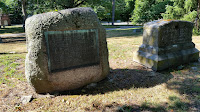 |
| Smith's grave at the Lowell Cemetery |
“God save Ireland,” he shouted out to the crowd. “Repeat it!”
And they did. Every seat on the
floor and in the gallery of Jackson Hall was filled to capacity. The crowds even poured out into the
streets. The one who had stood up and
shouted out to the crowd causing them to stand in unison was Lowell’s own
Joseph Smith. Former Congressman
O’Connell and Lowell’s Mayor O’Donnell had just concluded a night of speeches
and resolutions calling on Lowell’s Irish-American population to come to
Ireland’s defense and aid once the execution of the “rebels” of 1916 had begun.
Lowell, like much of the rest of the world, did not
immediately side with what would be called the Easter Rising of 1916. But once the executions began the tide
turned. In Lowell mass Indignation
Meetings took place beginning in May of 1916.
Groups such as Lowell’s branch of the Clan na Gael and the newly formed Padraic
H. Pearse branch of the Friends of Irish Freedom held regular meetings to call
on the British government to cease the executions and to raise funds to support
the people of Dublin who lost homes and livelihoods due to the bombing of the
city.
Many groups across the country began collecting funds
when they heard of women and children begging for food and fire wood in
Dublin. In Lowell, Smith even organized
a “tag day” where the ladies Auxiliary of the Ancient Order of Hibernians
solicited funds from downtown shoppers. Smith made many passionate speeches on
behalf of his native Ireland and spoke words such as. “The men who fought and
failed in Dublin have passed beyond the stage of criticism; they are now among
the immortals; stars in the firmament of freedom, and their names will be the rallying
cries of the lovers of liberty as long as the grass grows and water runs. The epithets and slanders hurled at the men
who loved liberty better than life are as harmless and useless as the barking
of dogs that bay at the moon; the dead of Dublin have nothing to gain from the
verdicts of time and posterity; it is the living of Ireland and America who
must keep watch and ward and to have and to hold what we posses of liberty
against the English plotter.” One can
imagine the white-haired man with the large mustache standing before the crowds
rousing everyone with his words. Each
speech he gave is filled with the language of a poet. A writer of verse he also wrote,
“There is blood on
the stones of Dublin,
There are dead in
her ancient streets;
That stare with
blind eyes at the ancient skies;
And are deaf to
the war drums’ beats.”
As one of the national directors of the Friends of Irish
freedom he and Mr. & Mrs. Thomas Hughes
Kelly of New York were elected to bring $50,000 collected by the
organization and churches. The money was
to be given to the Cardinal of Dublin to see that it was used for aid. When their ship arrived in Liverpool, England
the group was detained and then refused admittance. For days the newspaper kept the story
going. Calls were made to the British
embassy and to President Wilson demanding a reason why they were not allowed to
continue their journey. The British
government’s response was that Americans were free to enter, but a “member” of
this group seemed “hostile” and thus they were barred.
Upon his return to the States, Smith attained near
celebrity status, even touring with Nora Connolly, the martyred James
Connolly’s daughter. In no way did this
deter him from his goal. When he
returned to Lowell, he continued his speech-making and had the OMI Cadets give
out pledge cards asking those in attendance to keep up pressure on the British
for a free Ireland.
He soon left Lowell to write for Boston papers and often
wrote for Boston’s catholic newspaper, the Pilot where he became friends with
John Boyle O’Reilly. Mayor James Michael
Curly of Boston hired him to be his “publicity agent,” where he used his
writing skills to great advantage.
He and his wife made their home on Beacon Street in
Boston where he remained until his death in 1929. His funeral in Boston was attended by many
from politics and the newspapers. His
wish was to be buried in the Lowell Cemetery alongside his wife and young
daughter. Though he had been gone many
years the chapel was filled with old acquaintances as the priest from St. Ann’s
conducted the committal prayers. A moving inscription in part reads, “The day
of death is done. They have gone out
beyond the stars… where their souls are united.
Where peace and happiness are eternal and the everlasting God
abides.” Upon the reading of his will, large donations
were made to Lowell General Hospital and Boston College.
In one of his speeches he wrote, “As God lives, these men
shall live to inspire generations yet unborn, to dwell in the hearts of men,
and the songs of singers for the blood of the martyrs is the seed of liberty.”
No comments:
Post a Comment